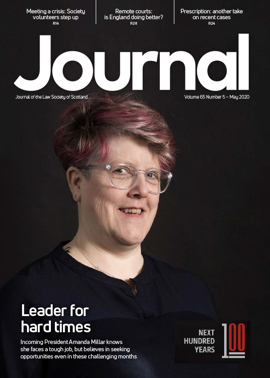COVID-19 and AWI: the Society's blueprint
Practitioners working with older and vulnerable adults may have particular concerns given the impact of the pandemic on this group and the need to protect the rights of incapable persons during the crisis.
The Coronavirus (Scotland) Act 2020 addressed immediate considerations by modifying the time limits in the Adults with Incapacity (Scotland) Act 2000 so as to stop the clock on existing orders and s 47 certificates. The Law Society of Scotland has also provided guidance for practitioners on implementing power of attorney (PoA) instructions using remote communications.
Further proposals dealing with more substantive issues have now been put forward to the Cabinet Secretary for Health and Sport by Society President John Mulholland on behalf of the Mental Health & Disability Committee. (The writer has no connection with the committee and writes in a personal capacity.)
Registration of powers of attorney
Practitioners are reporting an increase in the number of instructions. However, a PoA cannot come into operation until it has been registered with the Office of the Public Guardian (OPG). While the OPG has transitioned to homeworking, and registrations are continuing, not all PoAs meet the criteria for expedited registration.
The proposed interim solution is to allow a PoA to be capable of operation following presentation to the OPG, rather than registration. Under the proposed amendment, authority to act would take effect when the PoA is sent to the OPG, accompanied by a certificate signed by the solicitor who prepared it stating that the PoA is suitable for registration and it is appropriate for the attorney to have authority to act. It is envisaged that a form of certification would be provided, as well as more detailed guidance.
Guardianship and intervention orders
However, not everyone can grant a PoA. The “stop the clock” provisions assist existing guardians and interveners (although the committee raises an important point about judicial oversight of shorter orders and deprivation of liberty). However, there remain significant practical and procedural concerns about new guardianship applications. At time of writing it is unclear what constitutes an “urgent” application to the sheriff court, making it difficult to advise clients. Nor can any application be made without the three statutory reports. Even where social workers/psychiatrists are available to prepare them, conducting in-person assessments during lockdown raises obvious issues of risk and access.
The committee proposes, first, that a sheriff “shall” determine any application for interim orders within three days of receipt by the court. Secondly, application procedure would be modified such that (i) one medical report would be sufficient; (ii) a suitability report for a welfare application may come from a “person with sufficient knowledge”, rather than a mental health officer (MHO); and (iii) reporters’ enquiries may be conducted remotely.
While much may depend on guidance about appropriate reporters and the response of sheriffs, beyond the pandemic this may also facilitate debate about reporting requirements, given the issues with availability of MHO reports even before the pandemic.
Social work powers
The 2020 Act modified s 13ZA of the Social Work (Scotland) Act 1968 to remove the need to comply with the requirement to take account of the views of the adult, relatives and interested parties in terms of s 1(4) of the 2000 Act. This will only take effect if regulations are passed. While ministers have said this will only happen if absolutely necessary, the committee expresses concern about the human rights implications. The proposals accordingly include a provision that no powers conferred by the 2020 Act may be exercised so as to amend the terms of, or alter the effect of, s 1 of the 2000 Act.
Advance statements
Advance statements set out an individual’s wishes about future medical treatment. The extent to which such declarations are binding in Scotland is not settled, as there is no authority and no statutory provision (in contrast to England & Wales). It is likely that most practitioners would advise clients that such a statement would be regarded only as an indication of their wishes.
In the current crisis, treatment decisions may need to be made in urgent and rapidly changing circumstances. While they acknowledge it may be undesirable to legislate on this topic in the short term, the committee has proposed a statutory framework for advance statements to the effect that a valid and operative advance statement shall be binding subject to certain exceptions.
In conclusion, these proposals cover a range of practical and principled issues facing individuals seeking to plan ahead, care providers, and those responsible for incapable adults. It is hoped that they will inform a necessary public and professional debate on these important issues, and it will be of interest to see how this develops in the coming weeks.
Perspectives
Features
Briefings
- Steps to restraining the press
- The CJRS: a developing picture
- COVID-19 and AWI: the Society's blueprint
- Give me liberty or give me an ECHR-compliant lockdown!
- Pensions and the pandemic
- Secure digital signatures: moving forward in a crisis
- PSG: progress during the pandemic
- In-house, from home
- Scottish Solicitors' Discipline Tribunal






